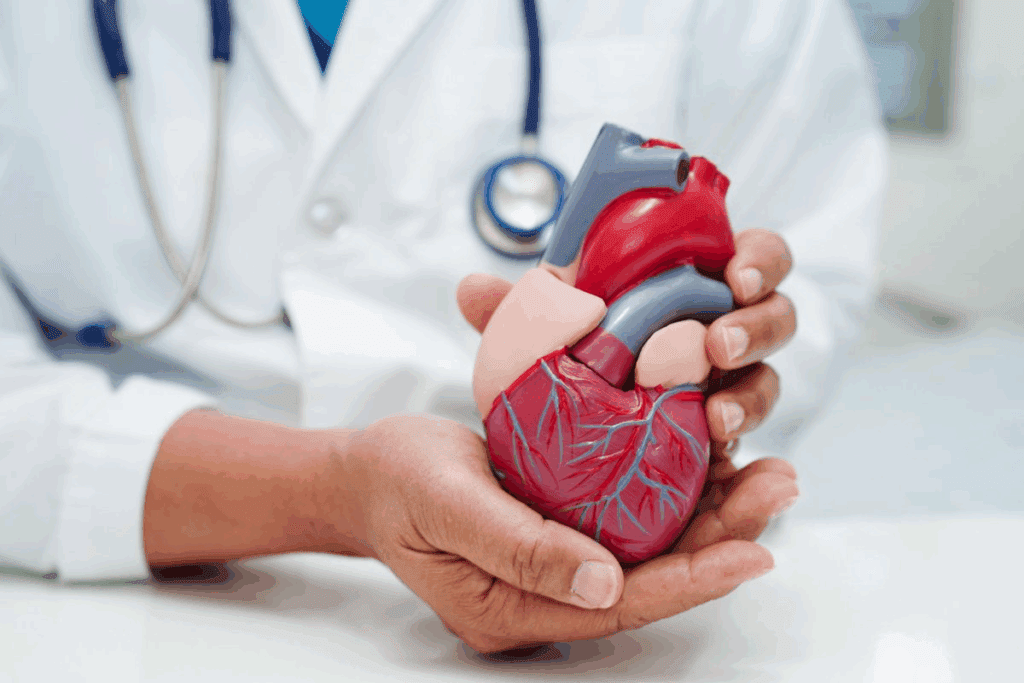
Feeling an irregular heartbeat can be scary. Many wonder what causes it and how to fix it. At Liv Hospital, we get it. We’re here to help with abnormal heart rhythms, or arrhythmias. Our team offers top-notch care and the latest in treating and finding arrhythmias.
Atrial fibrillation (AFib) is a common arrhythmia. It starts in the heart’s upper chambers. Symptoms include feeling tired, heart palpitations, trouble breathing, and dizziness. It’s important to know these signs and act fast to manage them well.
We’ll look into why it’s key to understand and tackle irregular heartbeats. We’ll also share effective treatments and tips for finding them.
Learn how to fix irregular heartbeat with effective treatments and tips.

Arrhythmia, or irregular heartbeat, happens when the heart beats too fast, too slow, or irregularly. It can be caused by heart disease, imbalances in electrolytes, and stress. Knowing about arrhythmia is key to managing and treating it effectively.
An abnormal rhythm of the heart, or arrhythmia, is when the heart’s rhythm is disrupted. This can make the heart beat too fast, too slow, or irregularly. The heart’s rhythm is controlled by electrical impulses. When these impulses are disrupted, arrhythmia can occur.

There are several types of heart rhythm disorders, including:
Arrhythmias are common, affecting millions globally. The risk of arrhythmia increases with age. Heart disease, high blood pressure, and electrolyte imbalances can also contribute to it. Understanding these risk factors is vital for prevention and early detection.
We will explore the signs and symptoms of arrhythmia in the next section. This will help you identify if you might be at risk.
Knowing what arrhythmia feels like is key to managing it. Arrhythmia, or irregular heartbeat, shows up in different ways. It’s important to know its common symptoms.
Arrhythmia can make your heart feel like it’s skipping a beat, fluttering, or pounding in your chest. Some say it feels like their heart is beating irregularly or too hard. These feelings can be scary and make you worry about your health.
Many people describe arrhythmia as their heart skipping a beat or fluttering. It might feel like a pause or an odd rhythm in your heartbeat. Others might feel a pounding sensation, where their heartbeat feels stronger or more forceful than usual.
Sometimes, arrhythmia makes the heart beat hard but slow. This can be a worrying sign of a heart rhythm problem. It’s important to watch for this and see a doctor for a check-up.
Sudden changes in heartbeat can be scary. Sudden erratic heartbeat experiences can happen without warning. They might be with other symptoms like dizziness or shortness of breath. It’s important to recognize these signs and get medical help when needed.
By knowing and recognizing arrhythmia’s signs and symptoms, people can take steps to manage it. This can help improve their quality of life.
There are many reasons why your heart might beat irregularly. These include problems with the heart itself and things outside of it. Knowing what causes an irregular heartbeat is key to treating it well.
Heart disease and structural issues are big reasons for an irregular heartbeat. Things like coronary artery disease and heart valve problems can mess with the heart’s rhythm. These issues can damage the heart’s electrical system or change its shape.
Electrolytes like potassium, sodium, and calcium help control the heart’s rhythm. An electrolyte imbalance can mess with the heart’s electrical activity, causing arrhythmias. This imbalance can happen for many reasons, like dehydration or certain health conditions.
Stress and anxiety can make your heart beat erratically. When you’re stressed, your body releases hormones like adrenaline. This can affect the heart’s rhythm. Long-term stress and anxiety can lead to persistent arrhythmias, making it important to manage stress.
Some medicines and stimulants can make your heart beat irregularly. This includes decongestants, asthma meds, and things like caffeine and nicotine. Also, some herbal supplements and over-the-counter drugs can cause arrhythmias.
Understanding why your heart might beat irregularly can help you manage it better. This can lower the risk of serious problems.
Wondering if you have an irregular heartbeat? There are ways to check your heart’s rhythm. Knowing your heart’s rhythm is key to spotting any problems that need medical help.
One easy way to check for an irregular heartbeat is by taking your pulse. Place your fingers on your wrist or neck to count beats in 60 seconds. A normal heart rate is 60 to 100 beats per minute.
If you notice skipped beats or a heart rate that’s always too high or too low, see a doctor.
Home devices make it easy to track your heart rhythm at home. Smartwatches, fitness trackers, and handheld ECG monitors offer insights into your heart’s activity. Some smartwatches can even detect irregular heart rhythms like atrial fibrillation.
Keep a record of your symptoms and what might cause them. Note when symptoms happen, what you’re doing, and any possible causes like stress or caffeine. This info helps your doctor understand and manage your condition.
Many digital tools can help monitor your heart rhythm. Mobile apps can connect to devices to track your heart rate over time. Some apps can even detect irregular heart rhythms using your phone’s sensors.
Choose tools that are FDA-approved and have good reviews.
Using these methods can help you understand your heart’s rhythm better. Work with your healthcare provider to manage any irregularities. Early detection and monitoring are important for addressing irregular heartbeats.
Diagnosing heart rhythm disorders needs a detailed approach. Various tests are used to find the type and cause of arrhythmia. This helps doctors create the best treatment plans.
An electrocardiogram (ECG) is a simple test that shows the heart’s electrical activity. It’s a key first step in finding arrhythmias. It gives quick info about the heart’s rhythm and electrical activity.
Key benefits of ECG testing include:
For those with symptoms that come and go, Holter and event monitors are used. A Holter monitor records the heart’s activity for 24 to 48 hours. Event monitors record heart activity at specific times, like when symptoms happen.
These monitors are great for:
An echocardiogram uses ultrasound to show the heart’s structure and function. It doesn’t directly measure rhythm but can spot structural heart diseases that might cause arrhythmias.
Echocardiography can show:
Stress testing checks how the heart works under stress, usually through exercise or medicine. It can find arrhythmias that happen during exercise and check the heart’s overall function.
The benefits of stress testing include:
It’s important to know the side effects of heart arrhythmia to manage it well. Heart arrhythmia, or irregular heartbeat, can cause many problems. These problems can affect the heart and overall health.
Short-term complications of arrhythmia can be scary and serious. They might include feeling dizzy or lightheaded because of poor blood flow. Sometimes, arrhythmia can cause fainting or near-fainting episodes. These can be risky, like when driving or using heavy machinery.
Another short-term issue is chest pain or discomfort. This can be very alarming and might need quick medical help. In bad cases, arrhythmia can cause heart failure. This is when the heart can’t pump enough blood for the body’s needs.
Long-term risks from arrhythmia are serious. One big risk is stroke. Irregular heartbeat can cause blood clots in the heart. These clots can then go to the brain, causing a stroke.
Another long-term risk is heart failure. This can happen if arrhythmia isn’t managed well. Also, arrhythmia can raise the chance of cardiac arrest. This is when the heart suddenly stops beating, which can be deadly if not treated fast.
Arrhythmia can really affect a person’s quality of life. Symptoms like palpitations, shortness of breath, and fatigue can make daily tasks hard. The unpredictability of arrhythmia episodes can also cause anxiety and stress. This can make life even harder.
To lessen the impact of arrhythmia on quality of life, managing it well is key. This means not just medical treatments but also making lifestyle changes. These changes include eating healthy, exercising regularly, and managing stress.
There are many ways to fix an irregular heartbeat. We’ll look at the medical treatments that can help manage arrhythmias.
Medicines are key in treating irregular heartbeats. Anti-arrhythmic drugs help control the heart’s rhythm. They make sure the heartbeat is steady.
It’s important to work with your doctor to find the right medicine and dosage. Everyone reacts differently to treatments.
Cardioversion is a procedure that uses a controlled electric shock to fix the heart’s rhythm. It’s often used for arrhythmias like atrial fibrillation.
Cardioversion can be done with medicines or electrical shocks. The choice depends on your health and medical history.
Catheter ablation is a procedure that uses energy to destroy bad electrical pathways in the heart. This helps fix arrhythmias.
This method is great for treating arrhythmias like SVT and atrial flutter.
Implantable devices are needed for some to manage irregular heartbeats. These devices help monitor and control the heart’s rhythm.
These devices are very effective in managing arrhythmias and preventing sudden cardiac death.
In conclusion, there are many medical treatments for irregular heartbeat. These include medicines and implantable devices. Each treatment is designed to address specific arrhythmia management needs. The right treatment depends on the cause, severity, and individual patient needs.
Heart-healthy habits can greatly help manage arrhythmias. By choosing the right lifestyle, people with irregular heartbeats can feel better. They can also live a better life.
Eating a balanced diet is key for heart health. Focus on fruits, vegetables, whole grains, and lean proteins. Try to cut down on saturated fats, trans fats, and sodium.
Nutritional Tips:
Regular exercise is vital for heart health. Patients should do moderate activities like brisk walking, cycling, or swimming. Aim for 150 minutes a week. Always talk to a doctor before starting a new exercise routine.
Exercise Precautions:
Stress can make arrhythmia symptoms worse. It’s important to manage stress well. Meditation, deep breathing, and progressive muscle relaxation can help.
Stress Reduction Strategies:
Good sleep is essential for heart health and overall well-being. Aim for a regular sleep schedule. Make your sleep area comfortable and avoid stimulating activities before bed.
Sleep Improvement Tips:
Some people find natural and complementary methods helpful in managing arrhythmia. These methods can be used alongside traditional treatments. They offer a more holistic approach to heart health.
Some individuals use supplements and herbs to manage their irregular heartbeat. Magnesium and potassium are often considered because of their roles in heart function. But, it’s important to talk to a healthcare provider before adding any supplements. They can interact with medications or have adverse effects in certain individuals.
A study in the Journal of the American College of Cardiology found magnesium supplementation can reduce arrhythmia episodes. But, more research is needed to understand the benefits and risks fully.
| Supplement/Herb | Potential Benefit | Precautions |
| Magnesium | Supports heart function, may reduce arrhythmia episodes | Can cause gastrointestinal side effects, interact with certain medications |
| Potassium | Essential for maintaining proper heart rhythm | Can cause cardiac arrhythmias if levels become too high |
| Hawthorn | May improve heart function and reduce symptoms of heart failure | Can interact with heart medications, including blood thinners |
Acupuncture, a part of traditional Chinese medicine, involves inserting thin needles into specific points on the body. Some research suggests it may help regulate heart rhythm and reduce stress. But, its effectiveness for arrhythmia management is not fully understood.
“Acupuncture may offer benefits for patients with cardiovascular diseases, including arrhythmias, by improving heart rate variability and reducing stress.” – Medical Expert, Cardiologist
Yoga and meditation can help reduce stress and promote relaxation. They may benefit individuals with arrhythmia. These practices can lower blood pressure, improve heart rate variability, and enhance overall well-being.
A study in the Journal of the American Heart Association found regular yoga practice can improve cardiovascular health. It can lead to significant reductions in arrhythmia symptoms.
Breathing exercises, like those in yoga or diaphragmatic breathing, can calm the nervous system. They may reduce arrhythmia episodes. These exercises are easy to practice anywhere, making them a convenient complementary approach.
By adding natural and complementary approaches to their lifestyle, individuals with arrhythmia may find more support. But, it’s important to talk to a healthcare provider before starting any new therapies or supplements.
If you’re feeling symptoms of arrhythmia, knowing when to get help fast is key. Arrhythmia, or an irregular heartbeat, can show up in many ways. Some of these may need urgent care.
Some symptoms mean you need to go to the emergency room right away. These include:
Being ready for your doctor’s visits is important for good care. Here’s what to do:
An emergency plan can help you act fast if you have a bad arrhythmia episode. Your plan should have:
Some people are more likely to face serious problems from arrhythmia. These include:
For these groups, watching your symptoms closely and getting medical help when needed is very important.
Understanding and managing arrhythmia is key to a better life. Recognizing signs and symptoms helps get timely medical help. This leads to effective treatments.
Living well with arrhythmia means using medicine, changing your lifestyle, and trying natural methods. We’ve looked at treatments like medication, cardioversion, and implantable devices.
Heart-healthy habits are also important. Eating right, exercising, managing stress, and getting enough sleep help. These actions lower the risk of complications and boost well-being.
Dealing with arrhythmia needs a team effort with doctors. A personalized plan helps control symptoms and prevent health problems. This improves life quality.
Living well with arrhythmia means being proactive and informed. Knowing about the condition and its management helps take charge of health. This leads to better care choices.
An abnormal rhythm of the heart is called arrhythmia. It happens when the heart beats too slow, too fast, or not in a regular pattern.
Arrhythmia can feel like a skipped beat or a fluttering in the chest. It might also feel like a pounding or an irregular heartbeat. Some people might feel a slow, heavy heartbeat or a sudden erratic one.
You can check for an irregular heartbeat by feeling your pulse. You can also use home monitoring devices or track your symptoms. If you’re unsure, see a healthcare professional for a proper check-up.
Erratic heart rate can be caused by heart disease or structural problems. It can also be due to electrolyte imbalances, stress, or certain medications.
Doctors use tests like electrocardiogram (ECG) testing and Holter monitors to diagnose arrhythmia. They also use echocardiogram and stress testing.
Heart arrhythmia can lead to short-term complications and long-term health risks. It can also greatly affect your quality of life.
Irregular heartbeat can be treated with medication, cardioversion, or catheter ablation. Lifestyle changes, like a healthy diet and managing stress, can also help.
Yes, making lifestyle changes can help manage arrhythmias. Eating a heart-healthy diet, exercising, managing stress, and getting enough sleep are all important.
Yes, some people find natural approaches helpful. This includes supplements, acupuncture, yoga, and meditation. But, always talk to a healthcare professional before trying these.
Seek emergency care if you have severe symptoms like chest pain, shortness of breath, or dizziness. Having an emergency plan and knowing warning signs is key.
Warning signs needing immediate care include severe chest pain, trouble breathing, severe dizziness, or a sudden irregular heartbeat.
An abnormal rhythm of the heart is called arrhythmia. It happens when the heart beats too slow, too fast, or not in a regular pattern.
Arrhythmia can feel like a skipped beat or a fluttering in the chest. It might also feel like a pounding or an irregular heartbeat. Some people might feel a slow, heavy heartbeat or a sudden erratic one.
You can check for an irregular heartbeat by feeling your pulse. You can also use home monitoring devices or track your symptoms. If you’re unsure, see a healthcare professional for a proper check-up.
Erratic heart rate can be caused by heart disease or structural problems. It can also be due to electrolyte imbalances, stress, or certain medications.
Doctors use tests like electrocardiogram (ECG) testing and Holter monitors to diagnose arrhythmia. They also use echocardiogram and stress testing.
Heart arrhythmia can lead to short-term complications and long-term health risks. It can also greatly affect your quality of life.
Irregular heartbeat can be treated with medication, cardioversion, or catheter ablation. Lifestyle changes, like a healthy diet and managing stress, can also help.
Yes, making lifestyle changes can help manage arrhythmias. Eating a heart-healthy diet, exercising, managing stress, and getting enough sleep are all important.
Yes, some people find natural approaches helpful. This includes supplements, acupuncture, yoga, and meditation. But, always talk to a healthcare professional before trying these.
Seek emergency care if you have severe symptoms like chest pain, shortness of breath, or dizziness. Having an emergency plan and knowing warning signs is key.
Warning signs needing immediate care include severe chest pain, trouble breathing, severe dizziness, or a sudden irregular heartbeat.
Government Health Resource. (2025). How to Fix Irregular Heartbeat Effective Treatments and. Retrieved from https://www.ahajournals.org/doi/abs/10.1161/CIR.0000000000001193
Subscribe to our e-newsletter to stay informed about the latest innovations in the world of health and exclusive offers!
WhatsApp us